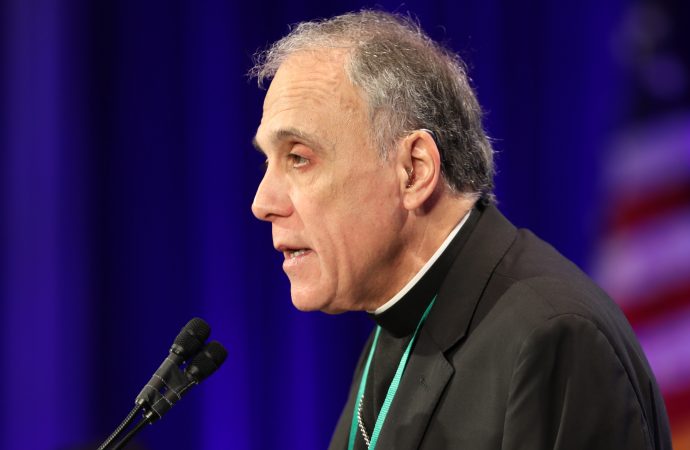Cardinal Daniel DiNardo, president of the United States Conference of Catholic Bishops (USCCB), echoed Pope Francis’s call for a “new ecclesial season,” in response to the clergy sex abuse scandals, saying that one positive fruit of the present crisis could be a deeper embrace of the Second Vatican Council.
DiNardo’s remarks came during a day-long conference on Wednesday sponsored by the Institute for Human Ecology at the Catholic University of America on “The Role of the Laity in Responding to the Crisis: Theological and Historical Foundations.”
The conference is part of an ongoing series at the university on “Healing the Breach of Trust,” in response to the clerical sexual abuse crisis.
In reflecting on Vatican II (1962-1965), DiNardo said he believed that the Holy Spirit is using the present moment “to open the Church, sometimes with great force, to what was developing half a century ago.”
Among the dominant themes of the Second Vatican Council was a greater call for lay leadership throughout the Church, and what DiNardo described as a “restored” understanding of the role of bishop as a shepherd, rather than as a corporate executive.
DiNardo’s remarks were largely an extended commentary of the pope’s 8-page letter to the U.S. bishops during their 8-day retreat last month at Mundelein Seminary in the archdiocese of Chicago.
The letter called on the bishops to “stop pointing fingers” and acting as mere administrators and to seek pastoral conversion toward unity as a first step in responding to the crisis.
The cardinal said on Wednesday that the “insights of the Council” were helping to guide the Church in this present moment through the Holy Spirit to “a new way of being authentic.”
Yet despite his concession for change in Church governance, DiNardo also made it clear that it will not be marked by some of the calls regularly mounted by various constituencies.
“This new ecclesial season will not be a radical change to the Church against some who do really want radical change. It cannot be one of stripping away the hierarchy or democratizing the Church, breaking with Rome, or any of the other proposals that I’ve heard.”
During a question and answer session that followed, he specifically rejected calls for married or women priests as part of the solution to the crisis.
The “radical change,” he insisted, in the words of Francis, was a radical conversion to Jesus Christ.
Among the practical ways in which he said the role of bishops could and should change is greater involvement of lay leadership in decision-making and authority.
“Bishops will have to learn new ways to share and delegate their administrative duties. The ‘new ecclesial season’ will have to be one where the shepherds have to recognize the charisms of the laity and encourage the exercise of those gifts for the good of the Church,” he said.
“This would be a sharing of the duties of administration that would allow bishops to attend more to their preaching and sanctifying roles and pastorally accompany their people. It would also allow the laity more fully to live out their own calling,” he continued.
At last November’s USCCB General Assembly, the bishops had originally planned to vote on new standards for bishop accountability that included an outside lay review board, however, a delay on voting on those procedures was requested by the Holy See due to canonical concerns.
On Wednesday, DiNardo briefly touched on that delay noting that while the bishops were originally disappointed, he believes the U.S. bishops are largely united in how to move forward with disagreements largely falling along the lines of whether they support a model of bishop accountability that relies on an outside national review board or one that utilizes the metropolitan option, wherein other bishops, in conjunction with an already existing diocesan review board, exercise such authority.
He also mentioned that there was a difference between younger bishops who wanted “to move with real force” and were “more angry” and older bishops who were in agreement with their diagnosis of the crisis but “know that prudence is also needed” in discerning how to move forward.
Later this month, DiNardo will represent the U.S. bishops at a high stakes Vatican summit called by Pope Francis where the heads of all global bishops’ conferences will meet in Rome for a three-day gathering of the crisis.
In recent months, however, DiNardo has come under fire for his own handling of sex abuse cases in the archdiocese of Galveston-Houston, specifically involving two different cases wherein his critics claim he either failed to act decisively enough or allowed credibly accused priests to remain in ministry.
The Texas cardinal spoke candidly about the anger of the laity over the crisis, telling the audience that he had received thousands of letters from lay Catholics expressing outrage at the U.S. bishops’ handling of sexual abuse cases. DiNardo said he has read an estimated 65 percent of the letters and a common theme is outrage over the handling of ex-Cardinal Theodore McCarrick who rose through the ranks of the hierarchy for years despite having abused at least three minors and allegations of misconduct against seminarians.
Going forward, DiNardo said he believed the “new ecclesial season” that he hopes will begin to bring much-needed healing to the Church can be found in two scripture passages: Acts 6 and 1 Corinthians 12.
The first, he said, offers a “theology of delegation” where the diaconate is established to help in Church leadership. The second, he summarized, speaks of a Church with one body, but many parts, which he said previews the “wider role of the laity” in governing.
Both, the cardinal said, offer a portrait of “missionary disciples,” which, as Francis told the U.S. bishops in January, is part of the necessary foundation for healing the breach of trust.

